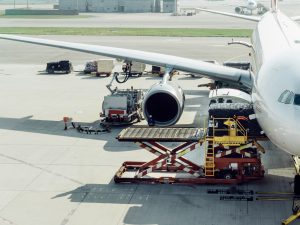Kempegowda International Airport (KIA) Bengaluru was recognised with the ‘Best Airport – Cargo Business’ Award at the recent India Cargo Awards 2025, celebrating its exemplary performance in the air cargo sector. The accolade highlights the airport’s commitment to operational excellence, efficient cargo handling, and fostering growth in India’s logistics ecosystem. This recognition underscores Bengaluru’s position as a leading hub for air cargo, reflecting the airport’s dedication to innovation, service quality, and seamless connectivity for domestic and international trade.
Read More »Automation/ACMES to improve efficiency: DCSC
Avinash Razdan, Group CEO, CSC Group, said, “DCSC has moved from manual documentation to electronic processing — e-AWB, electronic customs messaging, e-CSD, e-Gate Pass, 24×7 export and import operations. We use a unified system (ACMES) for cargo message exchange, slot/truck management, online visibility, streamlining interaction among cargo stakeholders. Close coordination with customs, forwarders and airlines is well-structured and institutionalised. DCSC works with many airlines and freighters, plus forwarders. DCSC’s collaboration with airlines, forwarders and customs includes digital workflows, integrated logistics infrastructure, efficient stakeholder interface (slots/trucks/warehouses), and service-level commitments (turnaround times).
Read More »GOX, TUI launch cargo flight to Manchester & Gatwick
Manohar International Airport, Goa (GOX) and TUI proudly announced the successful departure of the maiden TUI cargo flight to the United Kingdom, marking a significant step in enhancing Goa’s global connectivity. The new service will operate four times a week — twice to Manchester Airport and twice to Gatwick Airport — strengthening trade and logistics links between Goa and the UK. The inaugural flight achieved a record-breaking 14-tonne cargo uplift, a first for the region, symbolizing a major leap forward in Goa’s air freight capabilities. This milestone ushers in a new era of commerce, connectivity, and opportunity, paving the way for expanded international trade and travel from Goa. This remarkable achievement is a testament to the dedication, vision, and teamwork of everyone involved. Special appreciation is extended to ACFI, Goa Chamber of Commerce and Industry (GCCI) and ECS Group for their unwavering support. “Kudos to the Business Development team and the entire GOX family for making this milestone possible,” said GOX officials. “Together, we’ve opened the skies to new horizons for Goa’s growth and global engagement.”
Read More »Cargo services resume at Donyi Polo Airport
Air cargo services have resumed at Donyi Polo Airport, Itanagar, following a temporary suspension due to the operations shifting to the airport’s new terminal building. According to a statement from the office of Arunachal Pradesh Civil Aviation Minister Balo Raja, the BCAS Regional Director has informed the Donyi Polo Airport Director and the IndiGo services manager about the approval for the resumption of air cargo operations. This move ensures seamless cargo movement and strengthens the region’s connectivity.
Read More »INDIARPORT to focus on improving infra, skills & sustainability
The 11th PHDCCI Global Aviation & Air Cargo Conclave–2025 is ready to kickstart on 18 November at Yashobhoomi, Dwarka in New Delhi. The two day event aims to foster dialogue on the evolving dynamics of air transport, infrastructure development, policy frameworks, and the growing role of technology in shaping the sector’s future. It will also explore pathways for enhancing connectivity, improving cargo handling efficiency, and driving sustainable growth. The conclave will bring together the brightest minds and key stakeholders from India’s aviation and air cargo ecosystem. Organised by the PHDCCI in collaboration with leading industry bodies, the conclave will be held under the theme ‘INDIAIRPORT.’ With participation expected from govt officials, airline leaders, airport operators, and logistics experts, the conclave promises to be a platform for charting the next phase of growth in India’s aviation and air cargo landscape.
Read More »Rhenus expands airfreight capabilities in Southeast Asia
Rhenus Group plans to expand its airfreight capabilities further into Southeast Asia after setting up gateways in Singapore and Bangkok this year, which are considered as key trade hubs in the region and these new gateways complement Rhenus’ existing gateway in Kuala Lumpur, Malaysia, plus help optimise cargo flows across Southeast Asia, connecting to global trade lanes, said official release. The strategic gateways strengthen the presence of Rhenus across key air cargo corridors. Kuala Lumpur facilitates inbound cargo from Europe and outbound cargo to Oceania. Singapore handles inbound cargo from Asia or Oceania, and outbound cargo to the Americas, while Bangkok manages outbound cargo to Europe and serves as a multimodal hub to enhance intra-Asia trade capabilities through regional airfreight and cross-border trucking, added release.
Read More »Beyond Sqfeet honoured with the Excellence in Contract Logistics Award @ICA
Beyond Sqfeet Supplychain Solutions was honoured with the Excellence in Contract Logistics Award at the recently held India Cargo Awards. The recognition highlights the company’s outstanding performance and innovation in contract logistics, showcasing its commitment to operational excellence, customer satisfaction, and efficient supply chain management. This achievement underscores Beyond Sqfeet’s growing reputation as a leader in the logistics sector, setting new benchmarks for quality and service within the industry.
Read More »‘Build strong relations with authorities & train staff to boost efficiency’
Praveen Narayanan, Vice President, Asia Pacific, Group Concorde said, “In emerging markets like India, Southeast Asia, and Africa, GSSAs face regulatory complexity, infrastructure gaps, and intense competition. Variations in customs processes, inconsistent policies, and sudden regulatory changes create unpredictability, delaying cargo clearance. Inadequate airport infrastructure further complicates efficient operations. To navigate these, GSSAs must maintain agility, build strong local networks, and implement proactive compliance mechanisms. Further, strong relationships with local authorities and staff training on regional regulations are essential to ensure seamless operations despite external challenges.”
Read More »‘ACAAI needs to reinvent itself to stay relevant’
Parvinder Singh, MD, Hans Infomatic said, “The official agenda is well thought out and covers current issues and trends. ACAAI needs to reinvent itself to stay relevant and come up with innovative program. It’s quite usual now to see people not turning up for sessions post lunch, which is quite disappointing. Organiser need to come up ideas to engage delegates and bring them to sessions. Organisers work very hard to make the event a success, rest is upto the audience. Participation from local Forwarders community is there but could have been more. Maybe because Bali is a very small place. Overall, delegates are enjoying the resort and the weather.”
Read More »‘Discussions offered practical direction for turning constraints into growth’
Anupama Kachhap, Head of Commercial, WFS said, “The ACAAI Convention in Bali was a truly insightful experience. The theme ‘Connected yet Constrained: Transforming Trade Amidst Rising Barriers’ perfectly captured the challenges and opportunities in today’s global logistics landscape. The discussions on digital transformation, collaboration, and sustainability offered practical direction for turning constraints into growth. A well-organized event that inspired meaningful connections and forward thinking.”
Read More » Cargo Breaking News
Cargo Breaking News








